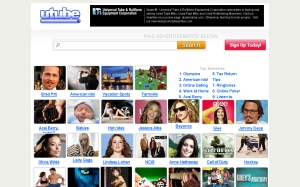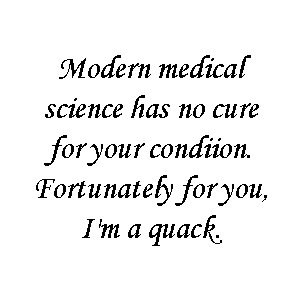[[This post originally appeared on my Stating the Obvious blog back in 2011. I’m resurrecting it because I’m currently taking a series of classes from people who are…interesting. Why interesting? Well, as an example, if you can’t remember the terms for what you’re teaching, perhaps you shouldn’t be teaching it. Or how about, if every student’s answer is correct – even when they contradict each other – perhaps the first part of the class should be “We’re going to be sharing opinions. There’s no right or wrong.” Or how about…
And this has more to do with me and my expectations than those teaching.
And I have definitely learned from them.
And here, for your enjoyment, I Can Crack My Knuckles Therefore I Must Be a Chiropractor! (Musings on Expertise) Enjoy!
This post is about lowering the bar. In a world where everyone is a guru, maven, jedi, rock star, queen, genius, leader and last but not least, expert, how do we recognize real ability from self-defined hype and bling? There have been two LinkedIn discussions that I know of, one in social media, the other in analytics, one from Apr 2011, the other from earlier in 2011 and both themed “What is expertise?” I wrote The Unfulfilled Promise of Online Analytics series (I’ll resurrect those, too, if you’d like) a while ago and one of its subthemes is “What is expertise?”
The level of “expertise” required to hang out a shingle has gone beyond touching the ground, it’s gone subterranean in many disciplines. And it’s pointless to create governance groups that offer accreditation because once such groups gain popularity they are usurped by vendors and HIPPOs to serve purposes different than governance and accreditation.
Let me offer some suggestions for marketers and consumers of expertise. Note: especially those marketing their teaching/editing/proofing skills.
Truth in Self-Marketing Rule #1: Never Believe Your Own Hype
Someone I know taught a class on social media for business. One of the topics discussed was “UTube”. I checked the ‘net just to be sure. Maybe “UTube” was the latest and greatest social networking/media site and I didn’t get the memo?
 Well, there is a “Utube” site. It’s for the “Uniform Tube & Rolliform Equipment Corporation”. Hey, again, maybe I just wasn’t up on things.
Well, there is a “Utube” site. It’s for the “Uniform Tube & Rolliform Equipment Corporation”. Hey, again, maybe I just wasn’t up on things.
But let’s be honest. Someone’s teaching a class in social media and either doesn’t notice or doesn’t correct that kind of error? You want to take a class with that person?
And let’s be even more honest. The people who sign up for that class? Do you want them as your customer? Yes, there’s an incredible number of them out there and also yes, nine times out of ten you’ll be teaching such a class to such consumers for free. If there’s 100 in the class you might get billable hours from two or three of them and those billable hours rarely cover a single grocery bill.
Such scenarios are great if your goal is to be well liked and loved, they’re rotten if you’re goal is to have a profitable business.
Truth in Self-Marketing Rule #2: Being Asked to Do Something Doesn’t Mean You’re Qualified to Do It
 The teacher of the above mentioned class has never posted a blog entry, isn’t on Twitter (they were at one point. I can’t find them now), hasn’t contributed to any social networks that I know of, isn’t on YouTube (or even UTube, for that matter), has only taken one very introductory class on using social media that I know of and (wait for it) has neither developed or implemented a business social media campaign to date.
The teacher of the above mentioned class has never posted a blog entry, isn’t on Twitter (they were at one point. I can’t find them now), hasn’t contributed to any social networks that I know of, isn’t on YouTube (or even UTube, for that matter), has only taken one very introductory class on using social media that I know of and (wait for it) has neither developed or implemented a business social media campaign to date.
Except for one family member.
Whoa!
Well hot dang of course they’re qualified to teach a class on social media for small business. Remember our mantra, “Lower the Bar!” All heroin addicts are hereby qualified to teach acupuncture!
Heck, if you’re going to lower it, go all the way!
Truth in Self-Marketing Rule #3: Your Credibility Is What Others Say About You, Not What You Say About Yourself
I know another person with much the same credentials as the individual above. This other person is advising people on how to design websites and target audiences. This person’s read a lot of online material on how to do it, though…
I once started a C-level presentation with “This is based on a little research I did…” Most rolled their eyes and some people prepared to leave the room. My host explained that Joseph’s “a little research” meant “sixteen years of daily research and study”. They stayed seated and paid close attention.
Reading two or three titles of online pieces and picking the one you’ll download and read is, to some, “research”. I know this. I’ve seen this. And I know being honest about one’s limitations isn’t good marketing.
It’s great business, simply not good marketing.
But if you truly believe you’re a guru, maven, rock star, jedi, queen, … because you read a couple of articles online? Buckminster Fuller said “An expert is anybody who can spit over a boxcar”.
Truth in Self-Marketing Consumer Rule #1: The Evidentiary Trail
I’ve written about evidentiary trails in a number of places. My favorite is from If You Think I’m Sexy and You Like My <BODY> (let me know and I’ll resurrect that one, too, if you’d like):
I will share an incantation with you, one I learned long ago and have used ruthlessly ever since. It is one of the most powerful magic spells known to humankind. It has stopped the high and the low immediately, confounded the minds of the wise and simple and brought strong men and women to their knees in remorse and shame. That incantation is Prove It!
I rarely accept marketing claims in any form from anybody, probably because I spend a lot of my time helping companies improve their marketing. One gets jaded. And clients get very upset when they ask NextStage (that’s the company Susan and I founded and owned. It grew from our basement to offices in four countries and representation in 120+ others before we moved on) the best way to market some claims and we respond “What’s the proof those claims are valid?”
“Well of course they’re valid. I just said them to you, didn’t I?”
Maybe it’s a byproduct of the information age that people believe opinions are evidence. They’re not. You know that, don’t you, dear reader? Just because someone says something is so doesn’t make it so.
Demand an evidentiary trail and you’ll discover your costs go way down. You stop buying things you don’t need, believing things that are grossly hyped or simply not true at all, …
Truth in Self-Marketing Consumer Rule #2: Contact References
Contact references and learn how to listen to responses. For example, you call a reference and they answer positively, simply not enthusiastically. Dig a little deeper. If someone did a good job, shouldn’t the recommendation’s energy reflect that somehow?
The other side of this is the person who provides a highly emotional, negative reference. Dig deeper there, too. Was the job done well, on time, under budget, but somebody didn’t get along with somebody? How come?
Truth in Self-Marketing Consumer Rule #3: Take Your Time
The truth is, if you have something that absolutely positively needs to get done overnight, your planning isn’t planning, it’s reacting and you’re creating emergencies where none exist.
Emergencies are dangerous in business. Businesses that create their own emergencies are ships waiting to sink. Lots of money gets wasted solving a problem rather than deciding if there’s a problem that needs to be solved. So take your time before hiring a guru, jedi, maven, genius, rock star, … Do some due diligence. It might save you from looking like an idiot, moron, fool, pigeon, dolt, …
So Come On, Folks! Let’s Pitch In and Lower that Bar!

I have no qualms whatsoever with people needing to make a living. Especially these days.
A corollary to the above Buckminster Fuller quote comes from mountaineering, “An expert is anybody who’s been there once.”
There’s a median between expertise and idiocy that I’ve hinted at above where few people (in my experience) are comfortable; You can have done something once and be an expert to those who’ve never done it all.
“…be an expert to those who’ve never done it at all.”
Want to be sure you read that.
Expertise is an audience appropriate quality. The definition of expertise varies according to the expertise of the audience. People who’ve been doing social media work for five years or more (truth in marketing; NextStage started studying and researching social media before the term existed, back in 2003) aren’t going to sign up for the class mentioned above.
Then again, people who’ve been in the game for five or more years are either willing to pay up to US$1,000 for a day long social media class or are teaching that class for US$1,000/head.
More truth in marketing — I don’t consider myself an expert at anything. The world is changing too rapidly for anybody to claim such a thing (my opinion). Yes, companies and groups hire NextStage and often speak of us as having expertise. We’ll quote them but not agree with them. I quickly correct with “We’re just researchers. We’ll change our opinions just a soon as good, solid, repeatable evidence comes in that invalidates our existing opinions.”
Summary
An interviewer once asked me “If you could change one thing about the business world it would be?” and I answered “If people would stop lying to themselves — not others, only to themselves — that would be the greatest change possible, me thinks.”
That requirement is especially true in self-marketing. It deals with managing customer expectations. Disingenuous claims of expertise are often found out and reputations get ruined. The other side of this is that nobody signs up for a class taught by a self-described novice.
The middle ground is (surprise!) honesty, a kind of “I can take you this far” marketing. Expertise consumers, when given reasonable goals and expectations, usually don’t need to know if someone’s an expert, guru, maven, rock star, queen, …, only that they’ll be further down their own road when the day is done.

2 thoughts on “I Can Crack My Knuckles Therefore I Must Be a Chiropractor! (Musings on Expertise)”